Top 10 Greatest Military Generals of All Time
It's more than just the win-loss column; greatness as a military general also has a lot to do with how they led. Did they display unparalleled tactical brilliance? Were they masterminds of strategy who could manipulate entire wars like chess masters? How about their ability to inspire troops and keep morale high even in the face of devastating losses? Or perhaps it's their enduring influence on military theory that impresses you most.You've got those who reigned in antiquity, whose exploits are half-myth, half-legend but no less awe-inspiring. Think Alexander the Great conquering empires before he was 30, or Hannibal Barca crossing the Alps with elephants just to take Rome by surprise. Fast-forward a few centuries, and you have gunpowder changing the game, with leaders like Napoleon Bonaparte demonstrating military prowess on a scale Europe had never seen. Don't forget the modern-day tacticians either, like Georgy Zhukov or Erwin Rommel, who had to grapple with a whole new breed of warfare - complete with tanks, airplanes, and all the complexities of the 20th century.
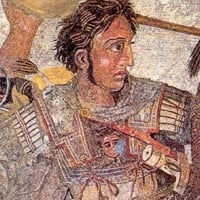 Widely considered one of the most successful military commanders in history, Alexander conquered a vast territory stretching from Greece to India. His use of combined arms, phalanxes, and innovative siege technologies revolutionized military strategy and tactics. Notable for his fearless leadership, Alexander was often at the forefront in battles, inspiring his troops. His military campaigns remain studies in tactical brilliance, and he never lost a major battle during his lifetime.
Widely considered one of the most successful military commanders in history, Alexander conquered a vast territory stretching from Greece to India. His use of combined arms, phalanxes, and innovative siege technologies revolutionized military strategy and tactics. Notable for his fearless leadership, Alexander was often at the forefront in battles, inspiring his troops. His military campaigns remain studies in tactical brilliance, and he never lost a major battle during his lifetime. While Alexander undoubtedly achieved the greatest victories and territorial gains of all antiquity, it is highly likely that if he had lived longer, he would have not only established a presence in the Hindu Kush, Indus Valley, and Bactria, but he would have certainly conquered the Indian subcontinent and Arabia. He would have also had a significant chance to threaten, if not completely destroy, China.
He was the one who set the legacy and inspiration for the establishment of large intercontinental empires and created the tradition of swiftly and briefly conquering vast amounts of territory. While the Muslims somehow surpassed even the Macedonians in this regard, accomplishing it with fewer men and against more powerful superpowers such as the Sassanids and Eastern Romans, while only having a foothold in the Red Sea region of Arabia. Alexander was the first to not only destroy an empire but also to conquer multiple civilizations and empires during his reign.
Thanks to him, the Greek language became widely spoken throughout Western Asia, Egypt, and the Balkan and Crimean regions of Rome. This resulted in the Greeks maintaining incredible importance despite being conquered by the Romans.
Overall, Alexander stands as one of the top three generals and military leaders of all time.
 The founder and first Great Khan of the Mongol Empire, Genghis Khan's military achievements are legendary. His innovative use of horse archers, psychological warfare, and disciplined military tactics led to the conquest of vast territories, from China to Eastern Europe. He developed advanced spying networks and utilized highly effective communication systems within his army. His capability to forge one of the most fearsome and effective military machines of the ancient world marks him as a general of extraordinary skill.
The founder and first Great Khan of the Mongol Empire, Genghis Khan's military achievements are legendary. His innovative use of horse archers, psychological warfare, and disciplined military tactics led to the conquest of vast territories, from China to Eastern Europe. He developed advanced spying networks and utilized highly effective communication systems within his army. His capability to forge one of the most fearsome and effective military machines of the ancient world marks him as a general of extraordinary skill. Genghis Khan ruled the largest contiguous empire in the world to date: the Mongol Empire. This empire covered almost all of Asia and some parts of Eastern Europe. The Mongols essentially eliminated anyone who got in their way, and no one could stop them - not even the Abbasid Islamic Empire.
They were eventually defeated by the Mamluks, but it's important to remember that the only reason they didn't conquer Western Europe was because their king fell ill. Had that not happened, who knows how the history of the world could have changed, especially considering that Western Europe later dominated the globe.
 Famed for leading an army across the Alps to invade Italy, Hannibal Barca's audacity and tactical ingenuity made him one of the greatest military commanders in history. He is best known for his victory at the Battle of Cannae, where he encircled and annihilated a much larger Roman army. His utilization of diverse troop types, including war elephants, showcased his adaptability and strategic depth. Hannibal maintained himself in Italy for over a decade, defying Rome on its own soil.
Famed for leading an army across the Alps to invade Italy, Hannibal Barca's audacity and tactical ingenuity made him one of the greatest military commanders in history. He is best known for his victory at the Battle of Cannae, where he encircled and annihilated a much larger Roman army. His utilization of diverse troop types, including war elephants, showcased his adaptability and strategic depth. Hannibal maintained himself in Italy for over a decade, defying Rome on its own soil. I'm going to say it: if it weren't for the stupidity of Carthage's politicians and the foolishness that filled the Carthaginian Senate, Hannibal would have conquered Rome. I'm not sure if that would have guaranteed victory in the Punic Wars, but he would have had a greater chance if the Carthaginian leaders possessed even half of the intellectual capacity of Rome's civil and political leadership. Even the Romans recognized the long-standing tradition of great potential and military talent within the Carthaginian military leadership, despite being a maritime and mercantile empire.
Despite limited resources and a lack of reinforcements (which were available and easily transportable with the Carthaginian navy's prowess) when he needed them the most, Hannibal came close to conquering the capital of the mighty Roman Republic.
Rome could literally lose 30,000 to 60,000 men and an entire fleet in battle or during a storm, and yet, somehow, they would rebuild that entire fleet and organize and mobilize entire legions within the next month. These legions and fleets would also have competent and skilled officers.
That is what Hannibal had to contend with. Despite these limitations, he achieved remarkable successes and came close to threatening the very existence of Rome itself. This fact alone demonstrates his military genius in achieving so much with limited resources and against political obstacles.
I would have placed him in the top 3, but the circumstances and difficulties he faced make him even greater than Alexander, who was originally planned to be my second choice. Therefore, Hannibal stands as the second-greatest military leader, just below Napoleon Bonaparte.
 Napoleon was a master of maneuver warfare, revolutionizing military organization and training in early 19th-century Europe. He was highly adept at utilizing the corps system, allowing for greater flexibility on the battlefield. Noteworthy are his triumphs in battles like Austerlitz, where he outmaneuvered a numerically superior Russo-Austrian army. Napoleon's military genius is also evident in his adaptation and modernization of artillery usage, which had a lasting impact on military strategy.
Napoleon was a master of maneuver warfare, revolutionizing military organization and training in early 19th-century Europe. He was highly adept at utilizing the corps system, allowing for greater flexibility on the battlefield. Noteworthy are his triumphs in battles like Austerlitz, where he outmaneuvered a numerically superior Russo-Austrian army. Napoleon's military genius is also evident in his adaptation and modernization of artillery usage, which had a lasting impact on military strategy. He was a godlike figure whose amazing charisma and military genius brought him victory after victory on the European continent and in Egypt. He was the Alexander the Great of his time and the modern Caesar. None could stand against him. His great flaw that ultimately led to his defeat was his belief in his own invincibility, which grew out of previous military victories he had won.
Napoleon has certainly done more good for the world than bad. Many people label him a tyrant and a military dictator, and in some ways, he was. However, he was the embodiment of the French Revolution. He was building an empire, but at the same time, he was spreading the ideals of liberty, equality, and brotherhood, which originated from the French Revolution.
He freed enslaved peoples in Croatia and Poland - so much so that his name is mentioned in the Polish national anthem. He also wrote a law code that remains with France to this day and serves as the basis for most other Western law codes. Napoleon was a great man, if not the greatest man, to ever have lived.
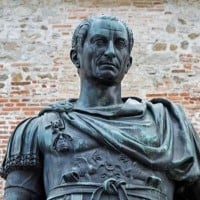 Celebrated for his military campaigns in Gaul and the Roman civil war, Julius Caesar was a general of extraordinary versatility. His signature achievement was the defeat of a vastly superior Gallic force at Alesia through a complex system of fortifications and sieges. Highly adaptable, Caesar also excelled in naval warfare, notably at the Battle of Pharsalus. His commentaries on the Gallic Wars serve as both historical records and textbooks on military strategy, underlining his brilliance as a general.
Celebrated for his military campaigns in Gaul and the Roman civil war, Julius Caesar was a general of extraordinary versatility. His signature achievement was the defeat of a vastly superior Gallic force at Alesia through a complex system of fortifications and sieges. Highly adaptable, Caesar also excelled in naval warfare, notably at the Battle of Pharsalus. His commentaries on the Gallic Wars serve as both historical records and textbooks on military strategy, underlining his brilliance as a general. Few commanders have ever enjoyed the loyalty that Caesar's legions had for him. Even fewer have won as many pitched battles. Often facing unfavorable odds, Caesar utilized brilliant tactics and discipline to overcome all challenges.
He fought battles in most corners of the known world, conquering all of Gaul and even Rome itself. Defined by aggression, preparedness, ingenuity, and courage, his legacy has endured through the ages. He remains a household name to this day, and his battle tactics continue to be studied by military minds. In my opinion, no military commander since has displayed such well-roundedness coupled with as high a success rate.
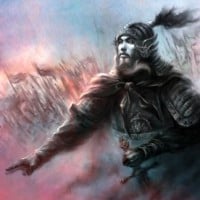 Tran Hung Dao is a national hero in Vietnam for his military leadership during the 13th-century Mongol invasions. Highly skilled in guerrilla warfare, he utilized the landscape effectively, employing techniques such as the use of spiked bamboo traps in river paths to counter Mongol naval advances. His most famous victory came at the Battle of Bach Dang River, where he used large iron-tipped stakes hidden during high tide to sink the Mongol fleet. His writings on military strategy have been studied and honored, ensuring his lasting fame as an exceptional general.
Tran Hung Dao is a national hero in Vietnam for his military leadership during the 13th-century Mongol invasions. Highly skilled in guerrilla warfare, he utilized the landscape effectively, employing techniques such as the use of spiked bamboo traps in river paths to counter Mongol naval advances. His most famous victory came at the Battle of Bach Dang River, where he used large iron-tipped stakes hidden during high tide to sink the Mongol fleet. His writings on military strategy have been studied and honored, ensuring his lasting fame as an exceptional general. If the Mongolian Empire had the strongest army in the world during that period of time, then the one that defeated that army three times must be even more fearsome. Therefore, I cast one vote for Tran Hung Dao.
Under his command, Dai Viet (currently Vietnam) armies defeated two major Mongolian invasions in 1285 and 1287. His victories over the mighty Mongol Yuan Dynasty under Kublai Khan are considered among the greatest military feats in world history, with strategies of protracted people's war.
The greatest general ever, one of the famous heroes in Vietnamese history.
 A General for the Confederate States during the American Civil War, Robert E. Lee is often cited for his tactical genius and audacious maneuvers. His victories at battles like Chancellorsville, where he divided his forces to flank and surprise Union troops, exemplify his skill in operational art. Despite being frequently outmanned and outgunned, Lee managed to keep the Confederate cause alive for a significant period. His work in fortification and defensive positions was highly influential, teaching later generations valuable military lessons.
A General for the Confederate States during the American Civil War, Robert E. Lee is often cited for his tactical genius and audacious maneuvers. His victories at battles like Chancellorsville, where he divided his forces to flank and surprise Union troops, exemplify his skill in operational art. Despite being frequently outmanned and outgunned, Lee managed to keep the Confederate cause alive for a significant period. His work in fortification and defensive positions was highly influential, teaching later generations valuable military lessons. One fact that is often forgotten about Lee is that he was not the commander of the Confederate forces in the Civil War. He commanded one army and, with that single army, conducted the total defense of the CSA. He was not allowed any command over the total war strategy used by his country and had no control over resources, troop movements, and logistics that go into winning a war.
The fact that his country mismanaged resources, did not collaborate in a cohesive defense, and offered no means of production for a prolonged war, illustrates how important and effective Lee's tactics really were. While the Union was able to focus their whole war strategy in concert against the South, Lee became the South as he won victory after victory against larger, better-equipped, better-trained, and better-fed troops. No other commander on this list had to fight with such handicaps, and no other commander would have seen Lee's success if they had to. It's easy to say that since the Confederacy lost, there must have been mistakes made by Lee as their best commander, but Lee is the general who nearly won an unwinnable war.
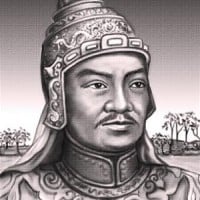 Also known as Emperor Quang Trung, Nguyen Hue led the Tay Son rebellion against the ruling dynasties in Vietnam and foreign invasions. Known for his hit-and-run tactics and ability to inspire troops, he crushed the Qing Chinese invasion at the Battle of Ngoc Hoi-Dong Da in 1789. He was innovative in utilizing elephants covered with flammable materials to break enemy lines. His strategic acumen and leadership significantly impacted Vietnamese military history and he remains a revered figure in Vietnam.
Also known as Emperor Quang Trung, Nguyen Hue led the Tay Son rebellion against the ruling dynasties in Vietnam and foreign invasions. Known for his hit-and-run tactics and ability to inspire troops, he crushed the Qing Chinese invasion at the Battle of Ngoc Hoi-Dong Da in 1789. He was innovative in utilizing elephants covered with flammable materials to break enemy lines. His strategic acumen and leadership significantly impacted Vietnamese military history and he remains a revered figure in Vietnam. Nguyen Hue, also known as King Quang Trung, was highly skilled in war strategies and tactics. He moved fifty thousand soldiers from Hue to Hanoi (more than 600 km apart) on foot in just 3 days in the late 1780s. He defeated the Chinese Tang army, which had 200,000 soldiers, in one day.
On another occasion, he defeated the invading Thai army of fifty thousand soldiers in just a few hours. He also defeated the French navy without having a warship of his own. He never lost a single battle in his entire life.
Dai De Nguyen Hue Quang Trung was unbeatable because he accomplished the impossible many times. He defeated 30 Qing armies, 20 Siamese armies, a French navy, and others. What's even more impressive is that he had to fight against overwhelming odds, and his enemies often had the advantage.
Even better, he achieved all of this in just four years. He was on the verge of turning Vietnam into a massive empire by conquering China and other kingdoms. Sadly, he died before he could accomplish this. However, if he had lived for ten more years, half of Asia would have been under his control, and Vietnam would have been a world superpower competing against powerful countries like Russia, Britain, and America.
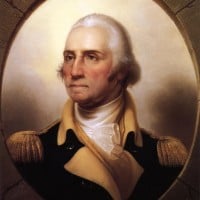 The first President of the United States was also a pivotal military leader during the American Revolutionary War. Although not trained in formal European military strategy, Washington excelled in using geography to his advantage and employing guerrilla tactics. His crossing of the Delaware River and subsequent victories at Trenton and Princeton demonstrated his audacity and ability to achieve surprise. Washington's leadership, both on and off the battlefield, was instrumental in securing American independence.
The first President of the United States was also a pivotal military leader during the American Revolutionary War. Although not trained in formal European military strategy, Washington excelled in using geography to his advantage and employing guerrilla tactics. His crossing of the Delaware River and subsequent victories at Trenton and Princeton demonstrated his audacity and ability to achieve surprise. Washington's leadership, both on and off the battlefield, was instrumental in securing American independence. Underrated both as a general and as a president. Name a military leader, other than Washington, who defeats the greatest army in the world and then leads the new country without force. Washington was able to do what Julius Caesar did, except Caesar accomplished it with the world's greatest army and by force.
An amazing leader - win, lose, or draw - he wins in the end in all areas. Though proclaimed an average military man by many, there was nothing "average" about Washington. "By George" (who else had their name used in place of God by the people he led?).
 Known for his role in the First Indochina War and the Vietnam War, General Võ Nguyên Giáp orchestrated the defeat of colonial and superpower adversaries against overwhelming odds. Giáp masterminded the siege of Dien Bien Phu in 1954, which led to the French withdrawal from Vietnam. He also adapted his forces and tactics in the long struggle against American intervention, combining conventional and guerrilla warfare. Giáp's military strategies significantly influenced modern guerrilla warfare theories, making him one of the most accomplished military minds of the 20th century.
Known for his role in the First Indochina War and the Vietnam War, General Võ Nguyên Giáp orchestrated the defeat of colonial and superpower adversaries against overwhelming odds. Giáp masterminded the siege of Dien Bien Phu in 1954, which led to the French withdrawal from Vietnam. He also adapted his forces and tactics in the long struggle against American intervention, combining conventional and guerrilla warfare. Giáp's military strategies significantly influenced modern guerrilla warfare theories, making him one of the most accomplished military minds of the 20th century. He is one of the most prominent generals of all time! Without him, Vietnam couldn't have defeated French colonial forces and America.
Oh yes, the general who has never been defeated. He even defeated two capitalist empires: France and America.
For me, greatness does not mean deploying an army to conquer the whole world, nor does it mean bringing war, blood, and tears to mankind. Greatness is leading a small nation to stand up and protect itself, to protect what is good, and to uphold righteous values through the most humane strategies. Vietnam's victories over the invaders from the US, France, and China are not just for the people of Vietnam. They are also great encouragement for enslaved nations to regain independence and govern themselves. I love Vietnam, President Ho Chi Minh, and General Vo Nguyen Giap!
 A commander in the German Army during World War II, Erwin Rommel earned his nickname for his skillful campaigns in North Africa. Renowned for his aggressive armored warfare strategies, he achieved several fast-paced victories against British and Commonwealth forces. He was a master of improvisation, often overcoming logistical shortcomings to outwit his opponents. Rommel's leadership qualities and audacity have made him a subject of extensive military studies.
A commander in the German Army during World War II, Erwin Rommel earned his nickname for his skillful campaigns in North Africa. Renowned for his aggressive armored warfare strategies, he achieved several fast-paced victories against British and Commonwealth forces. He was a master of improvisation, often overcoming logistical shortcomings to outwit his opponents. Rommel's leadership qualities and audacity have made him a subject of extensive military studies. He was indeed a good general. He was skillful and swift, earning him the title of "Desert Fox." Although he joined the German Nazi army, he didn't act like a typical Nazi. Instead, he remained humane.
When he was stationed in France during the construction of the Atlantic Wall, he didn't torture the French laborers but instead paid them a salary for their hard work. When Hitler asked him to deport the Jews, he didn't comply but spared them instead. The Afrika Korps was never accused of any war crimes, and Rommel himself referred to the fighting in North Africa as "Krieg ohne Hass" (war without hate).
Unfortunately, Hitler asked him to commit suicide just because Rommel disagreed with Hitler's policies and actions.
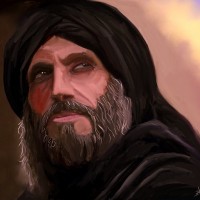 Known for his chivalry and tactical brilliance, Saladin effectively united Muslim forces during the Crusades and recaptured Jerusalem from the Crusaders in 1187. He innovated mobile tactics that emphasized speed and flexibility, often outmaneuvering heavily armored Crusader knights. His victory at the Battle of Hattin shattered Crusader power in the Holy Land and set the stage for his capture of Jerusalem. Saladin's ability to successfully wage war while gaining respect from both allies and enemies solidifies his legacy as one of history's great military leaders.
Known for his chivalry and tactical brilliance, Saladin effectively united Muslim forces during the Crusades and recaptured Jerusalem from the Crusaders in 1187. He innovated mobile tactics that emphasized speed and flexibility, often outmaneuvering heavily armored Crusader knights. His victory at the Battle of Hattin shattered Crusader power in the Holy Land and set the stage for his capture of Jerusalem. Saladin's ability to successfully wage war while gaining respect from both allies and enemies solidifies his legacy as one of history's great military leaders. Saladin's successful campaigns demonstrated his superior military skills and strategic judgment. In the 12th century, he brought the Muslim world together and commanded the Muslim forces fighting the Crusaders. The retaking of Jerusalem from the Crusaders in 1187 was Saladin's most notable accomplishment. His military tactics, which included surprise assaults, quick movements, and the efficient use of cavalry, helped him achieve numerous victories.
Besides that he was a great human being, certainly in the time of the Middle Ages in which Western countries were super barbaric. Saladin's reputation for chivalrous behavior won him the respect and admiration of both his allies and his adversaries. He was respectful to both his enemies and captives, frequently offering them favorable terms of surrender and honorable deals. Saladin distinguished himself from many other leaders of his time by treating prisoners with compassion and allowing them to be ransomed.
Saladin was in charge of the Muslim forces fighting the Crusaders, but he showed remarkable religious tolerance. He gave Christians safe passage to leave the city if they so desired after taking Jerusalem and allowed them to freely practice their faith. Saladin's dedication to religious harmony stands in stark contrast to some Crusader leaders' brutal treatment of Muslims and Jews.
He was not only a great military commander, but one of the greatest leader, human being, politician and economist of all time.
His compassion, ethics and manners in a time of widespread barbarism and atrocities (mostly against his people) are only rivaled by Cyrus the Great and Frederick The Great.
Top 6 at least.
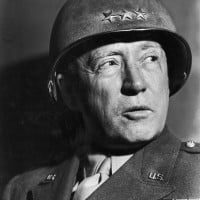 A key figure in World War II, U.S. General George S. Patton was renowned for his aggressive tactics and hard-driving armored advances. He played pivotal roles in the liberation of Sicily, the breakout from Normandy, and the relief of Bastogne during the Battle of the Bulge. Patton’s use of speed and audacity disrupted German plans and often forced them into unfavorable engagements. His leadership in multiple campaigns across varied terrains marks him as a versatile and effective military commander.
A key figure in World War II, U.S. General George S. Patton was renowned for his aggressive tactics and hard-driving armored advances. He played pivotal roles in the liberation of Sicily, the breakout from Normandy, and the relief of Bastogne during the Battle of the Bulge. Patton’s use of speed and audacity disrupted German plans and often forced them into unfavorable engagements. His leadership in multiple campaigns across varied terrains marks him as a versatile and effective military commander. Offensive in planning, attacking, and commitment, even his logistical methods were far more advanced than those he fought with or against. Decisions in the heat of battle were given only to those for whom it was in all human interest to succeed. Patton used his vision of the battlefield, gained from the lessons of the past, to defeat his enemy. His lust for achieving glory was his only defeating quality.
He fought Rommel on even tactics and won at every turn. Hitler was not afraid of Patton, but his generals were. He was certain to reach Berlin if not for Allied political positions that held up the war and increased the loss of life. Patton, for his age and the moment in a world at war, was the best leader and the best combat soldier to win.
 David IV, also known as David the Builder, was a Georgian king who reigned from 1089 to 1125 and is renowned for his military brilliance in defending and expanding his realm. He transformed the Georgian military, incorporating heavy cavalry and siege warfare techniques that proved critical in battles against invading Seljuk Turks. David IV also excelled in the use of tactics like feigned retreats and ambushes to defeat numerically superior forces. His reign marked the pinnacle of Georgia's power in the medieval era and his military successes laid the groundwork for the Georgian Golden Age.
David IV, also known as David the Builder, was a Georgian king who reigned from 1089 to 1125 and is renowned for his military brilliance in defending and expanding his realm. He transformed the Georgian military, incorporating heavy cavalry and siege warfare techniques that proved critical in battles against invading Seljuk Turks. David IV also excelled in the use of tactics like feigned retreats and ambushes to defeat numerically superior forces. His reign marked the pinnacle of Georgia's power in the medieval era and his military successes laid the groundwork for the Georgian Golden Age. In 1121, he led his army of 55,000 men and won against the Seljuks. Their army was composed of 600,000 soldiers. The battle of Didgori is often regarded as a battle of miraculous victory.
Before the battle, David ordered his troops to block their way back, addressing the soldiers that they would either win or die there. Over 70 percent of the Seljuks were killed, and the rest were taken as prisoners.
He was very young when he was crowned. He inherited not only political and economic problems but also disastrous results from earthquakes in previous years. However, in several years, he managed to gain victory over the Seljuks, who were a hazard for Europe, and thus he saved not only his own country but also Europe.
His name was widely known in the contemporary world, and in Europe, he was compared to St. Peter. He was also the savior of Armenia and Shirvan (the territory of modern Azerbaijan). These countries were quite weak at that time, and they asked King David the Builder to take them under his protection. By the way, the king was the only one who managed to free Ani, the former capital of Armenia, and give it back to the Armenians. So, his strategic point of view covered quite wide territories, and what's more important, he was not an emperor but maintained the national state structure in each country that went under his protection.
He managed to initiate the Golden Age of Georgia, which lasted almost two centuries. That's why he is called Saint King David the Builder!
He was truly the greatest!
 The 18th President of the United States gained his fame as a Union General during the American Civil War. Notably, his campaign against Vicksburg demonstrated his ability to conduct sieges and coordinate assaults across multiple fronts. Grant was relentless in applying pressure on Confederate forces, ultimately leading to the surrender of Robert E. Lee at Appomattox. His tenacity and willingness to engage the enemy played a key role in the Union’s ultimate victory.
The 18th President of the United States gained his fame as a Union General during the American Civil War. Notably, his campaign against Vicksburg demonstrated his ability to conduct sieges and coordinate assaults across multiple fronts. Grant was relentless in applying pressure on Confederate forces, ultimately leading to the surrender of Robert E. Lee at Appomattox. His tenacity and willingness to engage the enemy played a key role in the Union’s ultimate victory. The greatest American general in history, and one of the greatest generals in human history, Ulysses S. Grant should be ranked higher. He was a strategic and tactical genius, as well as a logistical one, resulting in an undefeated record. Even Cold Harbor was not a true defeat.
He directed multiple theaters and five armies across a continent by the end of the Civil War. First, he won the lower Midwest in a string of victories, then secured the Mississippi River at battles like Vicksburg, and finally defeated Lee in less than eight weeks to force a siege and ultimate victory. Although his reputation was tarnished by a persistent defamation campaign by Southern enthusiasts, the facts show otherwise. Grant was lionized in his time as one of the greatest generals, and that rightful reputation is gradually being restored.
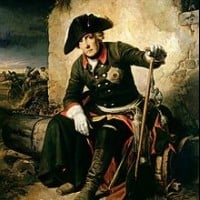 King of Prussia from 1740 to 1786, Frederick the Great was a military innovator who turned the Prussian Army into one of Europe's most formidable forces. He is best known for his victory at the Battle of Leuthen, where he used oblique order tactics to defeat a larger Austrian army. Frederick was a master of maneuver warfare, often choosing when and where to engage the enemy to his advantage. His military writings and reforms had a lasting impact on European military doctrine.
King of Prussia from 1740 to 1786, Frederick the Great was a military innovator who turned the Prussian Army into one of Europe's most formidable forces. He is best known for his victory at the Battle of Leuthen, where he used oblique order tactics to defeat a larger Austrian army. Frederick was a master of maneuver warfare, often choosing when and where to engage the enemy to his advantage. His military writings and reforms had a lasting impact on European military doctrine. This man took the worst of situations and made the very best of them. Prussia had a strong military, and that was about it. It had divided territory, a weak economy, a small population, and a small land area compared to powers such as France and Russia. He proved to the world that Prussia was a force to be reckoned with and could easily contend with the larger European powers of the time.
Frederick won most, lost some, but in those losses, he could have lost many more but made sure not to. His wins are outstanding. In three of them, he was outnumbered by 2-1 and yet he still won by a landslide. He deserves a place in the top 10. Even Napoleon thought he was the best.
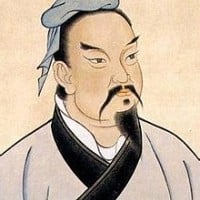 An ancient Chinese general and military strategist, Sun Tzu is most famous for authoring 'The Art of War', a treatise that has been influential in both Eastern and Western military thought. His concepts of deception, speed, and adaptability have been applied in various military conflicts throughout history. While the specifics of his life are shrouded in mystery, his strategic principles have been analyzed and utilized by military leaders for centuries. Sun Tzu’s enduring wisdom on the conduct of war cements his place as one of the greatest military minds.
An ancient Chinese general and military strategist, Sun Tzu is most famous for authoring 'The Art of War', a treatise that has been influential in both Eastern and Western military thought. His concepts of deception, speed, and adaptability have been applied in various military conflicts throughout history. While the specifics of his life are shrouded in mystery, his strategic principles have been analyzed and utilized by military leaders for centuries. Sun Tzu’s enduring wisdom on the conduct of war cements his place as one of the greatest military minds. Sun Tzu was a Chinese general, military strategist, writer, and philosopher who lived in the Eastern Zhou period of ancient China. Sun Tzu is traditionally credited as the author of The Art of War, an influential work of military strategy that has affected both Western and East Asian philosophy and military thinking. His works focus much more on alternatives to battle, such as strategy, delay, the use of spies, and alternatives to war itself. These include the making and keeping of alliances, the uses of deceit, and a willingness to submit, at least temporarily, to more powerful foes.
 A German Field Marshal during World War II, Erich von Manstein is credited with planning the Ardennes offensive, which led to the rapid defeat of France in 1940. Known for his operational brilliance, he also executed a successful withdrawal at the Battle of Kharkov, inflicting heavy losses on the Soviets. Manstein was capable of adapting to unfavorable conditions and turning them to his advantage. His innovative strategies and adept use of armored units make him one of the most studied military leaders of the 20th century.
A German Field Marshal during World War II, Erich von Manstein is credited with planning the Ardennes offensive, which led to the rapid defeat of France in 1940. Known for his operational brilliance, he also executed a successful withdrawal at the Battle of Kharkov, inflicting heavy losses on the Soviets. Manstein was capable of adapting to unfavorable conditions and turning them to his advantage. His innovative strategies and adept use of armored units make him one of the most studied military leaders of the 20th century. Manstein was easily the best general during World War II. "What about Eisenhower?" you may ask. Just look at how unorganized and chaotic D-Day was. On the other hand, Manstein is the reason Germany conquered France and held out as long as they did on the Eastern Front. The reason he failed was that Hitler didn't give him as much authority as he should have been given. He was also very brave, as he regularly spoke out when Hitler suggested a poor idea, something that most couldn't do. This political aspect also made him a very influential person during WWII.
 A central figure in the Bible, King David was not just a king but also a formidable military leader. His initial fame came from defeating the Philistine giant Goliath, showcasing his audacity and skill as a young warrior. David expanded the Kingdom of Israel through a series of successful military campaigns against surrounding nations. He was innovative in organizing his army, utilizing a variety of troops, including slingers, archers, and infantry. His military successes laid the foundation for the subsequent Israelite empire under his son Solomon.
A central figure in the Bible, King David was not just a king but also a formidable military leader. His initial fame came from defeating the Philistine giant Goliath, showcasing his audacity and skill as a young warrior. David expanded the Kingdom of Israel through a series of successful military campaigns against surrounding nations. He was innovative in organizing his army, utilizing a variety of troops, including slingers, archers, and infantry. His military successes laid the foundation for the subsequent Israelite empire under his son Solomon. As a boy, David killed a lion with his bare hands. He then killed a bear. His first battle was fought against the Philistines, in which he saved the Israelite army from certain doom by slaying a fully armed 9'9 warrior with just a slingshot. He also conducted a campaign against the Philistines in which he killed thousands.
David then successfully invaded the lands of the Geshurites, Gezrites, and the Amalekites. The Amalekites retaliated by capturing his wives and many more people, which prompted King David to defeat them in a hostage rescue. Later on in his career, David took the city of Jebus and renamed it Jerusalem. Soon after, David was crowned King of Israel, and the Philistines attacked but were unsuccessful.
Israel then faced the Philistines and their allies - the Moabites, Zobah, Syria, and Edom. Not only were they defeated, but David conquered all of their lands and enslaved their people. Another war erupted when the Ammonites tortured Israelite messengers, suspecting them of being spies. Realizing his mistake, King Hanun hired 20,000 Syrian mercenaries. However, King David attacked his capital and was victorious. This was not his last battle, as King David defeated the Philistines four more times. Overall, King David won at least 13 battles and was never defeated.
 One of the Soviet Union’s most effective generals during World War II, Georgy Zhukov played a decisive role in turning the tide against the Nazis. He is best known for his command during the Battle of Stalingrad and the capture of Berlin. Zhukov was adept at massing troops and resources for large-scale offensives, and his strategies often focused on overwhelming enemy positions. His resilience and ability to coordinate massive operations make him a standout figure in 20th-century military history.
One of the Soviet Union’s most effective generals during World War II, Georgy Zhukov played a decisive role in turning the tide against the Nazis. He is best known for his command during the Battle of Stalingrad and the capture of Berlin. Zhukov was adept at massing troops and resources for large-scale offensives, and his strategies often focused on overwhelming enemy positions. His resilience and ability to coordinate massive operations make him a standout figure in 20th-century military history. He could stand up to Stalin, a merciless, paranoid dictator, and walk away alive on every occasion. He commanded the defenses of Leningrad, Moscow, and Stalingrad - the most important battle in modern history - and drove the Germans all the way back to Berlin, where they signed an unconditional surrender to the Soviet Union and the Allies.
A general beloved by the Soviets, respected, and even admired by the West, he is the greatest general of modern history and quite possibly the reason the USSR won the Eastern Front, and with it, the Second World War as a whole.
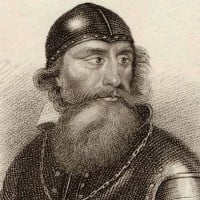
Deserves to be much higher on this list if victory against all the odds and adapting his strategy to beat a far larger and better-equipped opponent are any kind of measure. At one stage, he was reduced to a small band of followers whilst still wearing the crown of Scotland, a King in name only. His family were imprisoned or murdered, and yet by cunning, guile, and tremendous self-belief, he fought a bitter and relentless campaign against a ruthless oppressor, united Scotland, and won back her independence. An incredible story.
A national hero of Russia, Generalissimo, Field Marshal General of the Holy Roman Empire, and Great Marshal of the Piedmontese troops, Alexander Vasilievich Suvorov, also known as Count Suvorov-Rymniksky and Prince of Italy, is a Russian general and founder of Russian military theory. In total, he fought in more than 60 battles and did not lose a single one. He repeatedly defeated enemy forces that were significantly superior in numbers. He was also known for his great care for his soldiers.
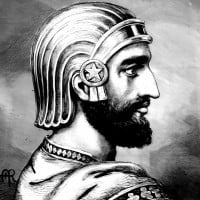 Founder of the Achaemenid Empire, Cyrus the Great is recognized for his military as well as his humane approach to governance. He excelled in siege warfare, showcased in the capture of Babylon where he diverted the Euphrates River to enter the city. Cyrus used a combination of diplomacy, strategy, and military might to expand his domain, laying the foundations for the largest empire the world had seen up to that point. His ability to win not just battles but also the hearts of his subjects made him a unique and enduring figure in military history.
Founder of the Achaemenid Empire, Cyrus the Great is recognized for his military as well as his humane approach to governance. He excelled in siege warfare, showcased in the capture of Babylon where he diverted the Euphrates River to enter the city. Cyrus used a combination of diplomacy, strategy, and military might to expand his domain, laying the foundations for the largest empire the world had seen up to that point. His ability to win not just battles but also the hearts of his subjects made him a unique and enduring figure in military history. I don't know why Cyrus isn't first. Alexander doesn't compare. His empire crumbled rapidly. Cyrus united people from tribes and empires across the known globe and managed them well. He is the only non-Jew to be considered a messiah in Jewish scripture.
He created the very first declaration on human rights. He handled everything with great diplomacy and spread order across the world. When diplomacy didn't work, he managed to destroy and consume everything in his path. He dethroned the world, yet still respected the people he conquered. Even the fearsome Spartans were afraid of him.
 Dwight David "Ike" Eisenhower was an American politician and general who served as the 34th President of the United States from 1953 until 1961. He was a five-star general in the United States Army during World War II and served as Supreme Commander of the Allied Forces in Europe.
Dwight David "Ike" Eisenhower was an American politician and general who served as the 34th President of the United States from 1953 until 1961. He was a five-star general in the United States Army during World War II and served as Supreme Commander of the Allied Forces in Europe. He was both a great general and U.S. President. His creative strategy made the Allies win World War II.
Unmatched at organization and supply chains.
Had to plan strategy and deal with silly subordinates at the same time.
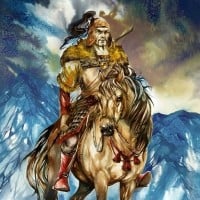 The ruler of the Hunnic Empire, Attila the Hun was feared across Europe for his relentless military campaigns. Exceptional in cavalry warfare and use of psychological tactics, Attila led invasions into territories ranging from the Eastern Roman Empire to Gaul and Italy. His strategies often involved rapid movements and sudden attacks, which disoriented larger and more cumbersome enemy forces. Attila’s leadership carved out a formidable empire that stood as a significant threat to both Roman empires.
The ruler of the Hunnic Empire, Attila the Hun was feared across Europe for his relentless military campaigns. Exceptional in cavalry warfare and use of psychological tactics, Attila led invasions into territories ranging from the Eastern Roman Empire to Gaul and Italy. His strategies often involved rapid movements and sudden attacks, which disoriented larger and more cumbersome enemy forces. Attila’s leadership carved out a formidable empire that stood as a significant threat to both Roman empires. Attila, the Scourge of God, ruled the Hunnic Empire from 434 to 453. This empire stretched from the Ural River to the Rhine River and from the Danube River to the Baltic Sea. During his reign, he was one of the most feared enemies of both the Western and Eastern Roman Empires.
He crossed the Danube twice, plundered the Balkans, and invaded the Eastern Roman Empire. He also attempted to conquer Roman Gaul (modern France) and invaded Italy, devastating its northern provinces. However, he was unable to take Rome. He had plans for further campaigns against the Romans, but he died in 453.